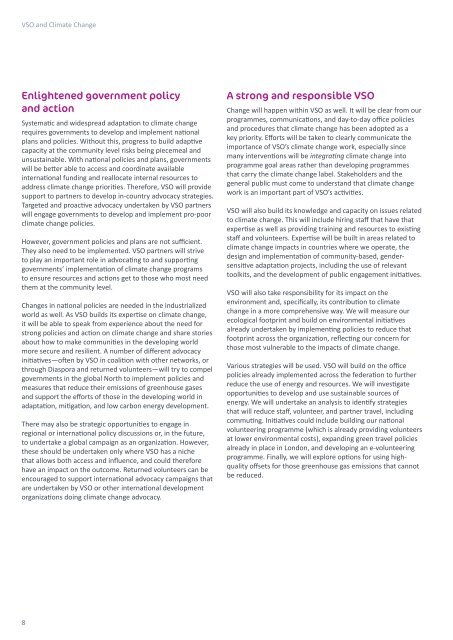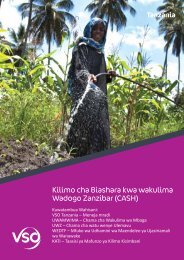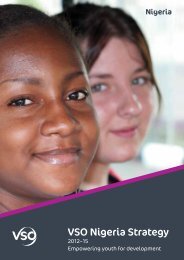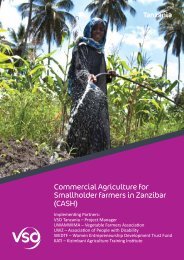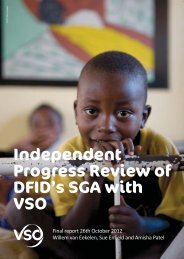VSO and Climate Change
VSO and Climate Change
VSO and Climate Change
You also want an ePaper? Increase the reach of your titles
YUMPU automatically turns print PDFs into web optimized ePapers that Google loves.
<strong>VSO</strong> <strong>and</strong> <strong>Climate</strong> <strong>Change</strong><br />
Enlightened government policy<br />
<strong>and</strong> action<br />
Systematic <strong>and</strong> widespread adaptation to climate change<br />
requires governments to develop <strong>and</strong> implement national<br />
plans <strong>and</strong> policies. Without this, progress to build adaptive<br />
capacity at the community level risks being piecemeal <strong>and</strong><br />
unsustainable. With national policies <strong>and</strong> plans, governments<br />
will be better able to access <strong>and</strong> coordinate available<br />
international funding <strong>and</strong> reallocate internal resources to<br />
address climate change priorities. Therefore, <strong>VSO</strong> will provide<br />
support to partners to develop in-country advocacy strategies.<br />
Targeted <strong>and</strong> proactive advocacy undertaken by <strong>VSO</strong> partners<br />
will engage governments to develop <strong>and</strong> implement pro-poor<br />
climate change policies.<br />
However, government policies <strong>and</strong> plans are not sufficient.<br />
They also need to be implemented. <strong>VSO</strong> partners will strive<br />
to play an important role in advocating to <strong>and</strong> supporting<br />
governments’ implementation of climate change programs<br />
to ensure resources <strong>and</strong> actions get to those who most need<br />
them at the community level.<br />
<strong>Change</strong>s in national policies are needed in the industrialized<br />
world as well. As <strong>VSO</strong> builds its expertise on climate change,<br />
it will be able to speak from experience about the need for<br />
strong policies <strong>and</strong> action on climate change <strong>and</strong> share stories<br />
about how to make communities in the developing world<br />
more secure <strong>and</strong> resilient. A number of different advocacy<br />
initiatives—often by <strong>VSO</strong> in coalition with other networks, or<br />
through Diaspora <strong>and</strong> returned volunteers—will try to compel<br />
governments in the global North to implement policies <strong>and</strong><br />
measures that reduce their emissions of greenhouse gases<br />
<strong>and</strong> support the efforts of those in the developing world in<br />
adaptation, mitigation, <strong>and</strong> low carbon energy development.<br />
There may also be strategic opportunities to engage in<br />
regional or international policy discussions or, in the future,<br />
to undertake a global campaign as an organization. However,<br />
these should be undertaken only where <strong>VSO</strong> has a niche<br />
that allows both access <strong>and</strong> influence, <strong>and</strong> could therefore<br />
have an impact on the outcome. Returned volunteers can be<br />
encouraged to support international advocacy campaigns that<br />
are undertaken by <strong>VSO</strong> or other international development<br />
organizations doing climate change advocacy.<br />
A strong <strong>and</strong> responsible <strong>VSO</strong><br />
<strong>Change</strong> will happen within <strong>VSO</strong> as well. It will be clear from our<br />
programmes, communications, <strong>and</strong> day-to-day office policies<br />
<strong>and</strong> procedures that climate change has been adopted as a<br />
key priority. Efforts will be taken to clearly communicate the<br />
importance of <strong>VSO</strong>’s climate change work, especially since<br />
many interventions will be integrating climate change into<br />
programme goal areas rather than developing programmes<br />
that carry the climate change label. Stakeholders <strong>and</strong> the<br />
general public must come to underst<strong>and</strong> that climate change<br />
work is an important part of <strong>VSO</strong>’s activities.<br />
<strong>VSO</strong> will also build its knowledge <strong>and</strong> capacity on issues related<br />
to climate change. This will include hiring staff that have that<br />
expertise as well as providing training <strong>and</strong> resources to existing<br />
staff <strong>and</strong> volunteers. Expertise will be built in areas related to<br />
climate change impacts in countries where we operate, the<br />
design <strong>and</strong> implementation of community-based, gendersensitive<br />
adaptation projects, including the use of relevant<br />
toolkits, <strong>and</strong> the development of public engagement initiatives.<br />
<strong>VSO</strong> will also take responsibility for its impact on the<br />
environment <strong>and</strong>, specifically, its contribution to climate<br />
change in a more comprehensive way. We will measure our<br />
ecological footprint <strong>and</strong> build on environmental initiatives<br />
already undertaken by implementing policies to reduce that<br />
footprint across the organization, reflecting our concern for<br />
those most vulnerable to the impacts of climate change.<br />
Various strategies will be used. <strong>VSO</strong> will build on the office<br />
policies already implemented across the federation to further<br />
reduce the use of energy <strong>and</strong> resources. We will investigate<br />
opportunities to develop <strong>and</strong> use sustainable sources of<br />
energy. We will undertake an analysis to identify strategies<br />
that will reduce staff, volunteer, <strong>and</strong> partner travel, including<br />
commuting. Initiatives could include building our national<br />
volunteering programme (which is already providing volunteers<br />
at lower environmental costs), exp<strong>and</strong>ing green travel policies<br />
already in place in London, <strong>and</strong> developing an e-volunteering<br />
programme. Finally, we will explore options for using highquality<br />
offsets for those greenhouse gas emissions that cannot<br />
be reduced.<br />
8


